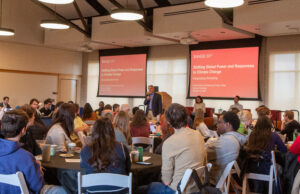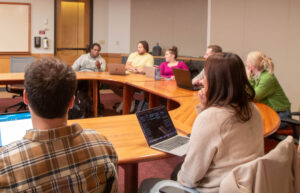EXTENDED! CO residents can apply FOR FREE through December 1st. Apply now!
Secure your scholarship offer in just 2-3 days through December 17! Get started.
No waiting. No guessing. Join us for Instant Decision Day on December 3. Register now.
EXTENDED! CO residents can apply FOR FREE through December 1st. Apply now!
Secure your scholarship offer in just 2-3 days through December 17! Get started.
No waiting. No guessing. Join us for Instant Decision Day on December 3. Register now.
Theory In Practice: Korbel's First-Year Cohort Forecasting Simulation
This reflection was written by Madison Bryant (MA, Global Economic Affairs, 2026), a first-year Korbel graduate student partaking in a simulation for the class, "Great Issues in International Affairs."
This Fall Quarter, my graduate cohort of over 100 students came together for an engaging simulation exercise that reminded me why I came to Korbel in the first place. Having the opportunity to get hands-on experience like this in class is such a unique experience, especially when all of your classmates are passionate about the same issues and bring different perspectives.

The simulation was part of our Great Issues in International Relations course, a class most first-year graduate students at Korbel take in their first fall quarter. It’s an exciting course that introduces us to the field and multiple faculty members. This quarter, the simulation happened in collaboration with Korbel’s own Pardee Institute and the Bertelsmann Foundation’s Range Forecasting, which meant we got to learn from experts in the field of forecasting. Dean Fritz Mayer addressed us before the simulation began, explaining how forecasting has always been a cornerstone of Korbel’s education. After learning a little bit about what Range does, we were split into ten discussion groups to discuss how trends in the “great issues” – globalization, nationalism, inequality, and democratic backsliding – could impact climate change response.
This simulation allowed me to connect with peers in other degree programs and interact with students with different perspectives to reflect on climate change solutions. While I sit next to different students every Monday morning, it was a different experience collaborating with them and learning from them, which I found to be the best part of the day.
In our groups, we assessed what signs would indicate one of three scenarios related to international cooperation for solving climate change. The scenarios highlighted the connection between climate change and inequity in development, with the third scenario being international policy moving to solve both climate change and underdevelopment. Finally, we used the Range forecasting platform to answer: “Will developed countries deliver $200 billion USD or more in financing to developing countries for climate action between January 1, 2026, and December 31, 2026?” This question required reflecting on our discussion and our readings for the week to determine the signs that this could happen. After using the platform to individually decide what we thought the probability was, we got to read through everyone else’s perspectives. My cohort spans multiple home countries and undergraduate degree programs, so it was exciting to see how people’s perspectives came through in their reflections.

Thanks to all of our discussions, I got a better grasp on modern global governance and climate change solutions. Post-graduation, forecasting skills will give any student, regardless of degree program, a competitive edge. Overall, forecasting skills and experiences like these are among what set Korbel graduates apart and allow us to have careers working to minimize harm across all our fields. I’m grateful for this opportunity, especially right away, given how many other first-year graduate students there are. This experience was engaging and informative, and made me look forward to every opportunity that I will have throughout my program.
Copyright ©2025 University of Denver | All rights reserved | The University of Denver is an equal opportunity institution